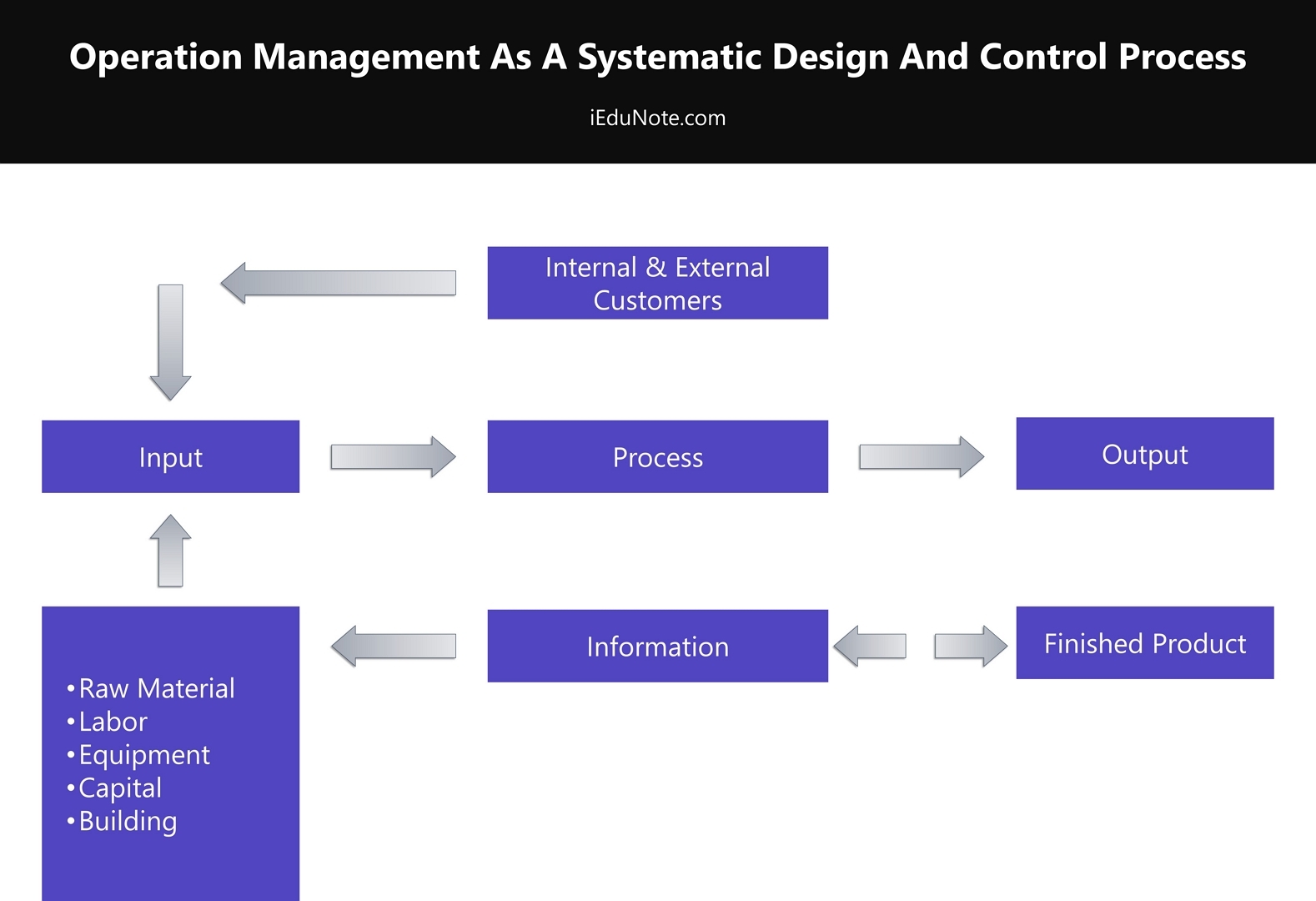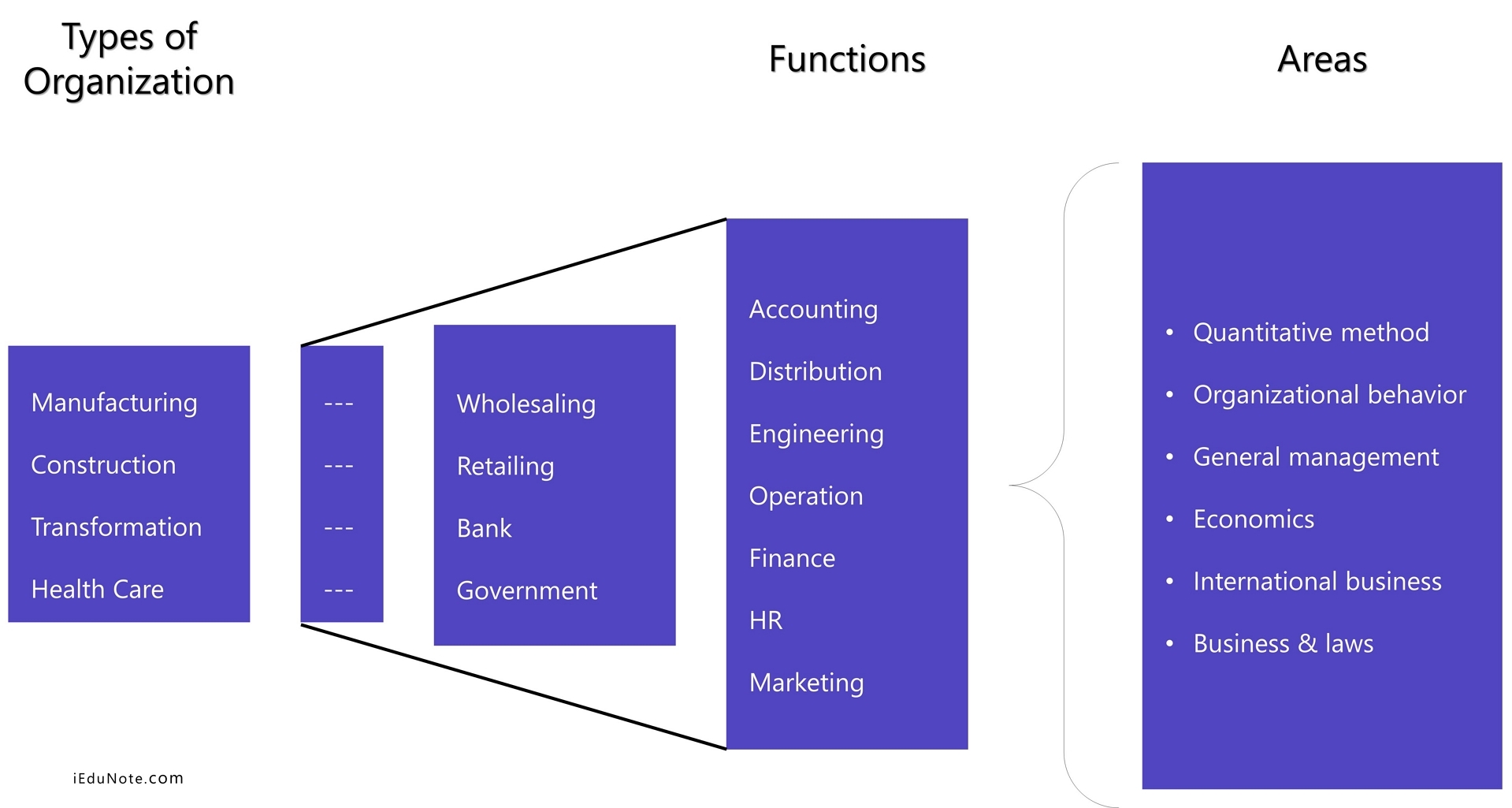Operation management refers to the direction and control of the process that transforms inputs into products and services. Broadly interpreted, operation management underlies all functional areas, because, processes are found in all business activities. Narrowly interpreted, operation refers to a particular department.
What is Operation Management? – Why Operation Management is a Systematic Design Direction and Control of Processes?
Operations management is an area of management concerned with overseeing, designing, and controlling the process of production and redesigning business operations in the production of goods or services.
In simple words, operation management as a systematic design direct and control of the process.
Operation management involves the systematic direction and control of the process that transform resources (input) into finished goods or services for customers or clients (output).
This basic model applies equally in manufacturing and services organizations and both the private and non-profit sectors.

- If the customers are dissatisfied, then the overall system should be revised.
- If the customer is being satisfied with the current process, then the process should be continued until the system/ process provides customer satisfaction.
- Finally, a transformation process is any activity or group of activities that takes one or more inputs, transfers, and adds value to them and provides for customers or clients.
Operation system must allocate resource to processes, enable processes to share and exchange information, protect the resources of each process from other process and enable synchronization among processes, to meet these requirements the operation system must maintain a data structure for each process, which describe the state and resource ownership of that process and which enables the operating system to exert control over each process.
2 principles in operation management should be kept in mind;
- Each part of an organization, not just the operations function, must design and operate processes and deal with quantity, technology, and staffing issues.
- Each part of an organization has its own identity and yet is connected with operations.
Importance of Operation Management
Operations management is a fundamental part of any organization.
Forbes magazine reported in 2011 that about three-quarters of all CEOs came from an operations background. Not all these CEOs studied operations in school; only some of them did.
Many majored in finance, marketing, information systems, or engineering and ended up in operations at some point in their careers.
Even if you don’t want to be a CEO or ever work in operations, you’ll probably have to work with operations people during your career.
So consider these facts about the impact of operations on various business functions:
Engineering
Engineers are notoriously great with numbers and focus.
That doesn’t always translate to being great with operations. Operations analysis is both quantitative and intuitive, and engineers without operations training can — and do! — waste millions of dollars when tasked to oversee operations.
For maximum benefit, you need to evaluate the individual process in the context of the overall system of processes it connects to.
So some operations knowledge can help engineers place their analysis of an individual process into an overall context of the operations system.
Finance
Corporate finance folks exercise oversight over budgets, so having some operations knowledge can help this team make good decisions.
For instance, when an operations leader asks for money to de-bottleneck a process, knowing what this means tells you the intent is to increase the capacity of an existing operation.
This almost always makes more economic sense than building a new plant. It also makes it easier to evaluate the costs and benefits of the investment. Otherwise, you may suspect it’s like spending money to put paint on an old jalopy.
Information Technology
A big part of IT within some companies is to automate operations. Knowing the core principles of operations can help these folks build an operations superhighway instead of paving a cow path.
Companies tend to accept the traditional way of doing things without question easily. There’s a great temptation to automate an existing process with embedded inefficiencies simply.
Some knowledge of operations may help IT, professionals, to more effectively partnering with operations management people to truly create a competitive advantage by improving processes while they automate.
Marketing
When the marketing folks come up with a new product idea or promotions concept, they need to talk to operations to find out whether it can be produced profitably.
If the answer is no — operations managers are sometimes a grumpy lot — persuading them to find a solution may be easier if marketing can speak the language of operations and understand their concerns.
Functions of Operation Management: How Operation Management Looks like in an Organization
As a firm grows in size, different departments must be created that assume responsibility for certain clusters of process.

From the above figure, it is seen that in large organizations, the operation department is usually responsible for the actual transformation inputs into finished product services.
- Accounting collects, summarizes, and interprets financial information.
- Distribution develops product and service designs and production methods.
- Finance secures and invests in the company’s capital assets.
- Human resource hires and trains employees.
- Marketing generates demand for the company’s output.
In small businesses, the owners might manage one or more functions, such as marketing or operations.
We can see that the operation management draws many skill areas, quantitative analysis to solve problems knowledge of information systems to manage vast quantities of data, concepts of organizational behavior to aid in designing jobs, and managing the workforce.
Operation Management as a Competitive Weapon
In the global era, business and govt, leaders are increasingly recognizing the importance of involving the whole organization in making strategic decisions.
Because the organization usually commits the bulk of its human and financial assets to operations, the operation is an important function in meeting global competition.
Largely because of foreign competition and the explosion of new technologies, recognition is growing that a firm competes not only by offering new products and services but also with unique competencies in operations.
The organization that can offer superior products and services at a lower price is a formidable competitor. That is why operation management is considered a competitive weapon in the current world.
5 Types of Operation Management Decisions
Decision making, both strategic and tactical, is an essential aspect of all management activities, including operation management. The types of Operating Management decisions can be divided into 5 categories;
-
Strategic choice
Operation management helps to determine the company’s global strategies and competing priorities and how best to design processes that fit with its competitive priorities.
-
Process
A Process is fundamental to all activities that produce goods and services. Ex: Operation Management make process decisions about the types of work to be done in house, the amount of automation to use and methods of improving existing processes.
-
Quality
Quality issues underlie all processes and work activities. Operations management helps to establish quality objectives and seek ways to improve the quality of the products and services.
-
Capacity, Location, and Layout
Operation managers help to determine the system’s capacity, the location of new facilities, and the organizations of departments and a facility’s physical layout.
-
Operating Decisions
At this stage, operation management takes the decision regarding supply chain management, inventory management, aggregate planning, resource planning, lean systems, and schedules, etc.